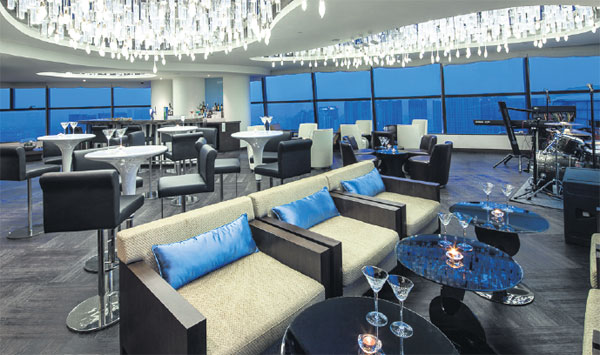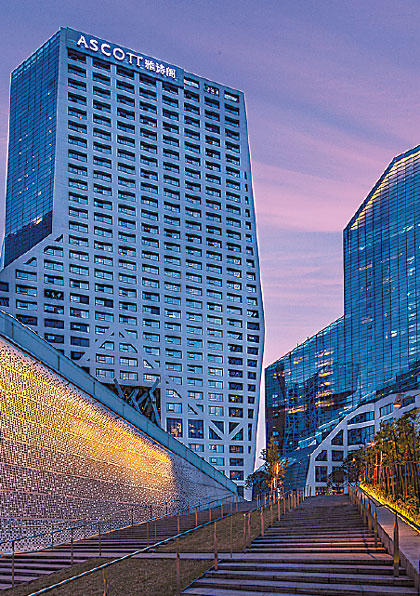Singapore hospitality in Chengdu
Updated: 2014-04-19 07:35
By Xu Lin (China Daily)
|
|||||||||||
Serviced apartments are gaining popularity in China, and more and more are establishing footholds in major cities all over the country. Xu Lin looks at the latest to open in Sichuan's provincial capital.
The Ascott brand is well recognized in China as a leader in the serviced apartment sector. Now, its presence is further reinforced with the opening of the Ascott Raffles City Chengdu, an occasion which coincided with the company's 30th anniversary.
It was also an event marked by a stellar presence, with popular Korean actor Park Hae-jin gracing the ceremony. He plays one of the lead roles in the hit television series My Love from the Star.
|
Chengdu becomes the third Chinese city to have Ascott's three serviced apartment brands, after Shanghai and Suzhou. Photos Provided to China Daily |
"We're expanding quickly in China, our biggest market. We're always trying to offer our guests the most comfortable and coziest experience at Ascott," says Tan Tze Shang, regional general manager for Greater China, Ascott China.
With Somerset Riverview Chengdu and Ascott Raffles City Chengdu in operation, Ascott Limited will open Citadines South Chengdu in June. This is the company's fourth serviced residence in Chengdu and two more in Chongqing are in the pipeline.
The Singapore-based corporation boasts more than 200 properties with more than 34,000 serviced residences in the Asia-Pacific, Europe and the Gulf region. The company operates three brands - Ascott, Citadines and Somerset, with 56 properties and over 10,000 units in 20 Chinese cities such as Beijing, Shanghai and Shenzhen.
As a part of the Raffles City Chengdu complex, the 298-room Ascott had its trial opening last October. It recorded a steady occupancy rate and is chalking up awards. It won the Excellent Serviced Residence of China award at the 2013 China Hospitality Development Summit.
Most of its guests are foreigners and their length of stay ranges from three months to a year.
"Chengdu's market for serviced residences has a large potential due to the city's rapid economic development," Tan says.
More than 220 of the Fortune 500 companies have opened subsidiaries or branches in Chengdu, in addition to large numbers of domestic corporations. Ascott's target customers in the city are expatriates from international corporations, staff members of consulates and the senior management of Chinese companies.
Darren Cher, area general manager of North and Central West China, Ascott China, says 10 years ago, their guests in China were almost all foreigners, but the trend is shifting.
"More Chinese are staying with us," Cher says.
He says it's because foreign companies are promoting more Chinese to management positions as part of their localization, and also because domestic companies are offering better compensation to their own senior management.
"The biggest difference between serviced apartments and hotels is that we offer greater and cozier space, with separate living room and dining areas. Our guests usually stay longer and they enjoy more privacy and safety because of the low mobility of guests," says Collin Foo, Ascott's deputy city manager of Chengdu and Chongqing. Foo is a Singaporean who used to work with Shanghai's Ascott residences.
Guests at the Ascott Raffles City Chengdu are offered several tiered choices, including studio, one-bedroom, two-bedroom and three-bedroom, and penthouse accommodation, all designed and decorated to make guests feel at home. All rooms come with fully equipped kitchens that have everything needed to prepare delicious meals, including built-in electric ovens and capsule coffee machines.
The residences at the Ascott in Chengdu also offer guests swimming and gym facilities, as well as close proximity to entertainment and shopping at the mall at Raffles City.
Tan says the usual profit ratio of a hotel is from 15 to 20 percent on average, but for a stable Ascott serviced residence, it is close to 60 percent because of the relatively lower costs that comes from having more compact public areas and a smaller staff.
According to Tan, Chinese guests started to learn about serviced residences and the demand from this sector has been increasing. Ascott's own Chinese teams have also helped the company gain a lot of ground in China.
"Competition in the industry is fierce but we're developing steadily. Guests require not only excellent facilities and amenities, but also good and innovative service. We've been strengthening our advantages with our service," Tan says.
Ascott hosts at all residences keep in touch with long-term guests to understand more about their lifestyle preferences so they can arrange appropriate services. The hosts will use their local knowledge to help guests solve problems and integrate into the new city as smoothly as possible.
For example, an American guest looking for an international primary school for his son was offered a detailed analysis of local schools.
Hosts also offer guests brochures with information in Chinese and other languages on nearby communities such as markets and shops. Sometimes, they will personally show guests around.
To make them more comfortable, Ascott also gives long-term guests in Chengdu a membership card which offers discounts at local restaurants and shopping malls. The company organizes regular activities for guests such as cooking, swimming and Chinese-language classes.
Contact the writer at xulin@chinadaily.com.cn.
|
Located in the center of Chengdu, the Ascott Raffles City Chengdu is very convenient because of its proximity to shopping malls and restaurants at Raffles City. |
(China Daily 04/19/2014 page17)
Today's Top News
Ukraine govt mulls constitutional reform
APEC fuels interest in English
Anti-graft push gives more family time
Property price surge could soon over
Three dead in Ukraine, Putin warns of 'abyss'
Ferry's captain under probe
Nobel laureate Marquez dies at 87
Quality of arable land 'worrying'
Hot Topics
Lunar probe , China growth forecasts, Emission rules get tougher, China seen through 'colored lens', International board,
Editor's Picks

|

|

|

|

|

|







